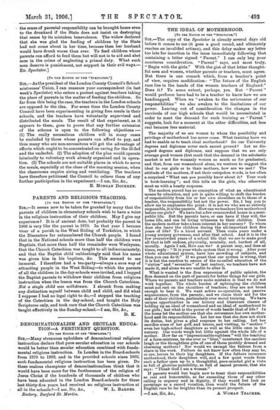THE IDEAL OF MOTHERHOOD. LTo THE EDITOR OF THE "SPECTATOR."1
Sra,—The copy of the Spectator is already several days old before it comes to me (it goes a good round, and ultimately reaches an invalided artisan), and this delay makes my letter too late for insertion in the issue immediately following that containing a letter signed "Parent." I can only beg your courteous consideration. "Parent" says, and most truly, " Begin with the girls." With the gist of that letter thought- ful men and women, whether parents or teachers, must agree. But there is one remark which, from a teacher's point of view, requires modification : "The future of the English race lies in the hands of the women teachers of England." Does it? To some extent, perhaps, yes. But " Parent " would perforce have had to be a teacher to know how we are handicapped. When we "awaken to the seriousness of our responsibilities" we also awaken to the limitations of our power. Leaving out of consideration the changes in the curricula of our high schools that would be necessitated in order to meet the demand for such training as " Parent " suggests, look for a moment at the other difficulties, not less real because less material.
The majority of us are women to whom the possibility and privilege of motherhood has never come. What training have we had to enable us to teach ideal motherhood ? Do our University degrees and diplomas cover such sacred ground ? Let us dis- regard degrees and diplomas, and suppose that we are only average good women (but mark that the demand in the seholiv.stic market is not for womanly women so much as for graduates), and that, from our womanhood alone, we venture to suggest the ideal to our girls or to their mothers, how are we met ? The attitude of the mothers, if not their outspoken words, is too often a surprised "What can you possibly know about it? Your work is book-learning "; and this tells on the girls, who otherwise meet us with a hearty response.
The modern parent has no conception of what an educationist means by education, and yet is quite willing to shift the burden of responsibility from his or her own shoulders on to those of a teacher, the responsibility but not the power. Sir, I beg you to allow me to emphasise the point : it is not we who are so entirely responsible, it is the parents. How can we teachers live motherhood before our girls ? We have but a few overcrowded hours in a semi- public life. But the parents have, or can have if they will, the home life, and can be living witnesses to their children. Does the modern mother take a keen interest in her nursery ? To whom does she leave the children during the all-important first five years of life? To a hired servant. Then come years under a young nursery governess, and after that school. And it is in the few overcrowded years of a school life that we are to make good all that is left undone, physically, mentally, and, hardest of all, morally. Again I ask, How can we? A parent may, and does at times, reply : "It is your whole system that is wrong. Alter your whole educational system, have less crowding of subjects, and then you can do-it." If we grant that our system is wrong, that it is but the reaction to excess of the so-called education of the " sixties " and " seventies " of last century, we teachers have not made it, and alone we are unable to alter it.
What is wanted is the firm expression of public opinion, the firm demand on the part of parents for better things for our girls. Where we parents and teachers make mistakes is that we do not work together. The whole burden of upbringing the children must not rest on the shoulders of teachers ; they are not broad enough to bear it. We want active co-operation, not passive acquiescence, from the parents ; and we claim their aid for the sake of their children, particularly over moral training. We have unique opportunities in our history and literature classes of holding up an ideal of womanhood and an ideal of motherhood to our girls ; but what is the power of words beside that of life ? In the home let the mother see that she reverences her own mother- hood and its responsibilities. Let her see that she does not shirk its duties, but gives a glad response to her calling. Let her sacrifice some of her golf, and tennis, and visiting, to " mother " even her high-school daughters as well as the little ones in the nursery. Our words weigh but little against the whole life of a mother. How far on "impressionable eighteen" will the teaching of a ferm-mistress, be she ever so "blue," counteract the careless laugh or the thoughtless gibe of one of those prettily dressed and charming mothers ? Nor would we exempt the fathers from a share in the work. Fathers do not know how often they may be, or are, heroes to their big daughters. If the fathers reverence motherhood, their daughters will, and a few quiet words from such a father open up to a thoughtful, pure-minded girl a vista so full of glorious possibility, so full of sacred promise, that she says : "Thank God I am a woman."
If parents would but begin now to treat their responsibilities as real and honourable, as far exceeding those of any other calling in urgency and in dignity, if they would but look on parentage as a sacred vocation, then would the future of the English race be far brighter than its present prospect.










































 Previous page
Previous page